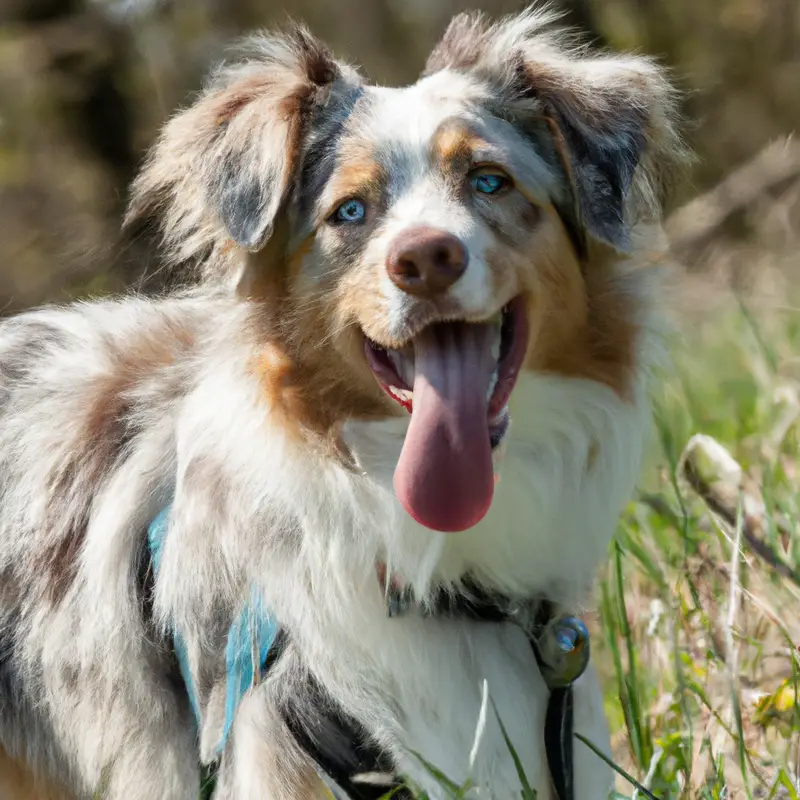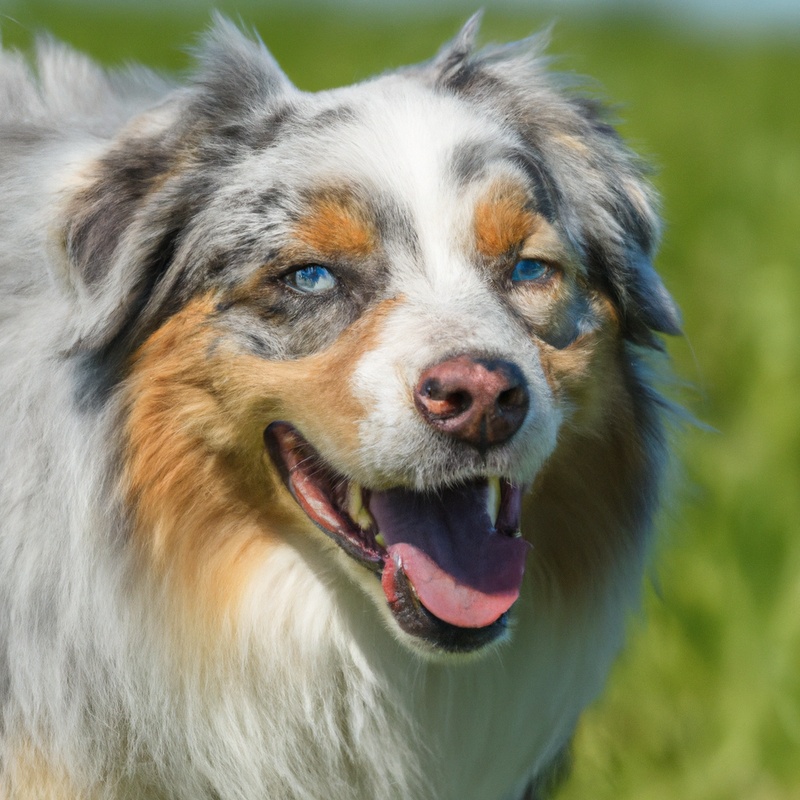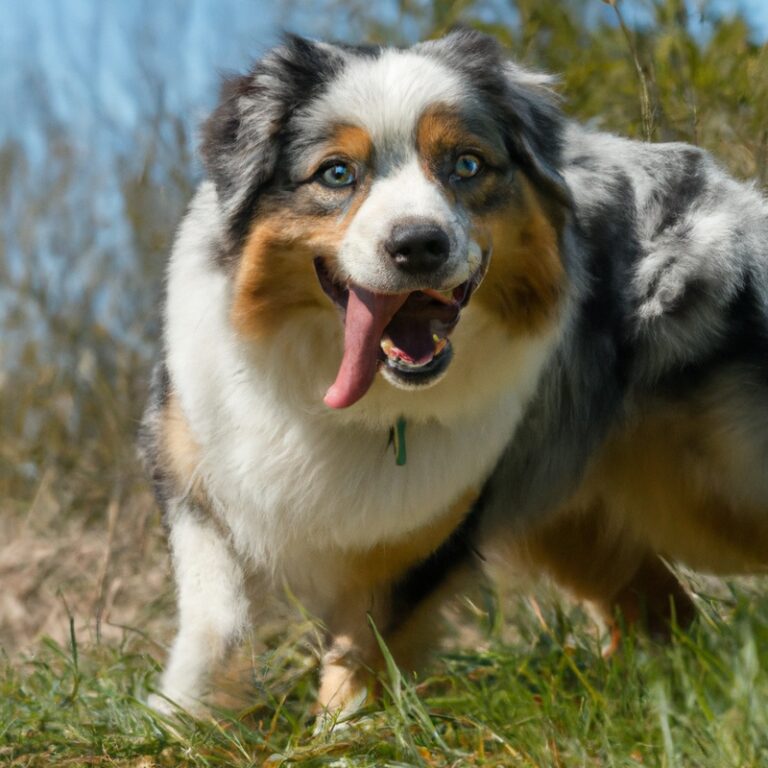Can Australian Shepherds Be Aggressive Towards Humans?
Key Takeaways:
- Australian Shepherds can exhibit aggression towards humans, but it is relatively uncommon.
- Aggression in Australian Shepherds is often associated with poor socialization or underlying behavioral issues.
- Early training, socialization, and positive reinforcement can help prevent aggression in Australian Shepherds.
- Proper handling, leadership, and clear boundaries are important in managing and reducing aggressive behavior in Australian Shepherds.
Are you considering adding an Australian Shepherd to your family? These loyal and intelligent dogs are beloved for their stunning looks and outstanding work ethic.
But before you bring one into your home, you may be wondering, can Australian Shepherds be aggressive towards humans?
As an expert in dog behavior, I’m here to shed some light on this topic. In this article, we’ll dive into the origins and characteristics of Australian Shepherds, explore aggression in this breed, and examine the factors that may contribute to aggression towards humans.
Plus, I’ll share valuable tips on prevention and responsible ownership to ensure a harmonious relationship with your furry friend.
So, let’s get started!
| Can Australian Shepherds be aggressive towards humans? |
|---|
| Yes |
| No |
Understanding the Australian Shepherd Breed
Origins and characteristics of Australian Shepherds
Australian Shepherds are a herding breed that originated in the United States, despite their misleading name. These dogs were initially bred to work on ranches and farms, herding livestock such as sheep and cattle.
They are known for their incredible agility, intelligence, and work ethic.
Australian Shepherds have a medium-sized, muscular build and are known for their striking coat patterns and colors, which can include combinations of black, red, blue merle, and red merle. They have a dense double coat that provides protection in various weather conditions.
In terms of temperament, Australian Shepherds are typically highly energetic, intelligent, and loyal.
They thrive on mental and physical stimulation and require regular exercise and mental challenges to prevent boredom and undesirable behaviors. They are known for their ability to learn and excel in various dog sports, including obedience, agility, and herding trials.
While Australian Shepherds are generally friendly and good-natured, they can be reserved with strangers and exhibit protective instincts towards their family and property.
Proper socialization and training from an early age are essential to ensure that they grow up to be well-rounded and well-behaved dogs. Australian Shepherds are known for their strong herding instincts, which can sometimes manifest as nipping or herding behavior towards children or small animals.
These behaviors can be managed and minimized through consistent training and boundaries.

General temperament and behavior of Australian Shepherds
Australian Shepherds are known for their high energy, intelligence, and loyalty. They are generally friendly and affectionate dogs, making them great family pets.
Australian Shepherds have a strong herding instinct and may try to herd children or other pets.
They are also highly trainable and excel in various dog sports and activities. However, they need plenty of mental and physical stimulation to prevent boredom and destructive behavior.
It’s important to provide them with consistent training and socialization from an early age to ensure they grow into well-rounded and well-behaved adults.
Australian Shepherds thrive in active households where they can receive lots of exercise and attention. They bond closely with their owners and can be protective, so it’s essential to establish clear leadership and boundaries.
Overall, Australian Shepherds have a lively and outgoing temperament, but with proper guidance and care, they make wonderful companions.
Factors that can influence aggression in Australian Shepherds
Several factors can influence aggression in Australian Shepherds. One significant factor is their genetic predisposition.
Like any breed, Australian Shepherds may have certain genetic traits that can contribute to aggressive behavior.
Another factor is their upbringing and socialization. Dogs that have not been properly socialized from an early age are more likely to exhibit aggressive behaviors.
Additionally, a lack of training and obedience can also contribute to aggression in Australian Shepherds.
Dogs that have not been taught proper manners and boundaries may resort to aggression when they are unsure or feel threatened. Furthermore, fear and anxiety can play a significant role in aggressive behavior.
Australian Shepherds that have had negative experiences or feel insecure may display aggression as a defense mechanism.
It’s important to note that aggression in Australian Shepherds is not solely determined by breed. External factors such as a traumatic event or certain environmental stimuli can also contribute to aggressive behavior.
It is crucial to identify and address these factors in order to manage and prevent aggression in Australian Shepherds.
Can Australian Shepherds Be Aggressive?
Exploring aggression in Australian Shepherds
Exploring aggression in Australian Shepherds is essential to understanding their behavior. While aggression is not common in this breed, it can occur in certain situations.
Factors that can influence aggression include genetics, improper socialization, fear, and resource guarding.
It’s important to identify signs of aggression such as growling, snapping, or biting, and address any underlying issues promptly. Proper training, socialization, and a consistent routine can help prevent aggression.
Seeking professional help is recommended if aggression becomes a concern.
Identifying signs of aggression in Australian Shepherds
Identifying signs of aggression in Australian Shepherds is important for the safety and well-being of both the dog and the people around them. Here are some signs to look out for:
- Growling and Snarling: If an Australian Shepherd growls or snarls when approached or touched, it may indicate aggression. This is their way of warning others to back off.
- Baring Teeth: When an Australian Shepherd exposes its teeth, it can be a clear sign of aggression. This is usually accompanied by other aggressive behaviors such as stiff posture or intense staring.
- Lunging or Biting: A dog that lunges or bites towards people or other animals is displaying aggressive behavior. This can be a dangerous sign and should be addressed immediately.
- Raised Hackles: When the hair along an Australian Shepherd’s back stands up, it’s a sign of arousal or aggression. This can be a warning sign that the dog is feeling threatened or is about to display aggressive behavior.
- Guarding Behaviors: Australian Shepherds may become possessive or territorial over food, toys, or their personal space. This can manifest as growling, snapping, or biting when someone approaches these items.
Remember, it’s essential to assess the overall context of a dog’s behavior and not just focus on a single sign in isolation. If you notice any of these aggressive behaviors consistently, it’s crucial to seek help from a professional trainer or behaviorist who can provide guidance and support in managing and modifying your Australian Shepherd’s aggressive tendencies.
Common triggers for aggression in Australian Shepherds
Common triggers for aggression in Australian Shepherds can vary from dog to dog, but there are a few common factors that may contribute to this behavior. One trigger can be fear or anxiety, which can arise in situations where the dog feels threatened or overwhelmed.
This can include encounters with unfamiliar people or animals, or being put in unfamiliar or stressful environments.
Another trigger can be resource guarding, where the dog becomes protective over their food, toys, or territory. This can lead to aggressive behavior if someone or another animal approaches these resources.
Lack of socialization and proper training can also contribute to aggression in Australian Shepherds, as they may not know how to interact appropriately with humans or other dogs.
Lastly, pain or discomfort due to injury or medical conditions can cause a normally friendly Australian Shepherd to become aggressive. It is important to remember that aggression is not a characteristic of the Australian Shepherd breed as a whole, but rather a behavior that can be influenced by various factors.
Understanding and addressing these triggers can help prevent or manage aggression in Australian Shepherds and promote a safer and more harmonious relationship between them and their owners.
Aggression Towards Humans: Is It Common in Australian Shepherds?
Understanding the relationship between Australian Shepherds and humans
The relationship between Australian Shepherds and humans is generally positive and strong. Australian Shepherds are known for being loyal, affectionate, and bonded with their owners.
They thrive on human interaction and are often eager to please.
These dogs are usually gentle and friendly towards their human family members, including children. They enjoy spending time with their owners and can become emotionally attached.
A well-socialized and trained Australian Shepherd can be a loving and devoted companion.
However, like any breed, individual dogs may vary in their temperament and behavior. It is important to provide proper training, socialization, and a nurturing environment to ensure a healthy and positive relationship with your Australian Shepherd.

Frequency and severity of aggression towards humans in Australian Shepherds
Aggression towards humans in Australian Shepherds can occur, but it is not very common. The frequency and severity of aggression vary from dog to dog.
Some Australian Shepherds may show mild signs of aggression, such as growling or snapping, while others may exhibit more severe behaviors like biting.
It’s important to note that aggression is not a breed-specific trait and can be influenced by various factors, including genetics, socialization, training, and individual temperament. Proper socialization and training from an early age can greatly reduce the risk of aggression towards humans.
While Australian Shepherds are generally friendly and gentle dogs, it’s crucial to closely monitor their behavior and address any signs of aggression promptly.
Seeking professional help, such as consulting a certified dog behaviorist or trainer, can be beneficial in managing and modifying aggressive behaviors. Remember to always prioritize the safety of both your Australian Shepherd and those around them.
Educating yourself about canine behavior and providing a safe and stimulating environment can help prevent aggression towards humans.

Factors that may contribute to aggression towards humans in Australian Shepherds
There are several factors that can contribute to aggression towards humans in Australian Shepherds. These factors include:
- Lack of socialization: Australian Shepherds that have not been properly socialized may become fearful or anxious in new situations. This can lead to aggression as a way to protect themselves.
- Lack of training: Dogs that have not received proper obedience training may not understand how to interact appropriately with humans. This can result in aggression if the dog feels threatened or overwhelmed.
- Fear or pain: Australian Shepherds that are experiencing fear or pain may lash out at humans as a defensive response. It is important to address any underlying issues and provide appropriate medical care.
- Protective instincts: Australian Shepherds are known for their herding instincts and may exhibit protective behavior towards their family. If they perceive a threat, they may become aggressive as a way to protect their loved ones.
- Genetic predisposition: Some Australian Shepherds may have a genetic predisposition to aggression. While genetics alone do not determine behavior, it is important to be aware of any potential predispositions and take appropriate measures to prevent and manage aggression.
It is important to note that aggression towards humans in Australian Shepherds is not common, and the majority of these dogs are friendly and well-behaved. However, it is essential to provide proper socialization, training, and care to minimize the risk of aggression.
Seek professional help if needed and always prioritize the safety of both your dog and the people around them.
Prevention and Management of Aggression in Australian Shepherds
Early socialization and training to prevent aggression
Early socialization and training are key to preventing aggression in Australian Shepherds. Introducing your Aussie to a variety of people, animals, and environments from a young age helps them develop positive associations and reduces the likelihood of fear-based aggression.
Additionally, consistent and positive training methods, such as reward-based techniques, establish clear boundaries and reinforce good behavior.
It’s important to seek guidance from a professional dog trainer to ensure you are using effective techniques and addressing any potential aggression issues early on. With proper socialization and training, you can help your Australian Shepherd grow into a well-behaved and non-aggressive companion.
Establishing a consistent and positive training routine
Establishing a consistent and positive training routine is essential for Australian Shepherds. Training should be based on positive reinforcement methods, such as rewards and praise, to encourage desired behaviors.
Consistency is key; setting clear expectations and using the same commands and techniques will help your dog understand what is expected of them.
Regular training sessions, short and frequent, will ensure that your Australian Shepherd retains information and stays engaged. Patience and persistence are necessary for effective training, as every dog learns at their own pace.
Seeking guidance from a professional trainer can provide additional support and help address any specific behavioral concerns.
With a consistent and positive training routine, you can foster a well-behaved and happy Australian Shepherd.
Seeking professional help for aggressive Australian Shepherds
If your Australian Shepherd is showing signs of aggression, seeking professional help is crucial. A professional dog trainer or behaviorist can provide expert guidance and support to address the aggression effectively.
They will assess the behavior, identify triggers, and develop a personalized training plan to modify your dog’s behavior.
A professional will use positive reinforcement techniques to teach your Australian Shepherd alternative behaviors and help them react more appropriately in various situations. They may also recommend management strategies to prevent aggressive outbursts, such as using muzzle training or implementing a structured routine.
Remember, aggression in Australian Shepherds can be complex, and it’s important to work with someone experienced in dealing with this specific breed.
They can provide guidance on socialization, obedience training, and appropriate communication techniques. Don’t hesitate to seek professional help if you’re dealing with an aggressive Australian Shepherd.
They can help you understand the underlying causes of the aggression and guide you towards a safer and happier relationship with your furry friend.
Responsible Ownership and Handling of Australian Shepherds
Providing a safe and stimulating environment for Australian Shepherds
To provide a safe and stimulating environment for your Australian Shepherd, there are a few key things to keep in mind. First, ensure that your home and yard are secure, with no potential hazards or escape routes.
Australian Shepherds are active and curious dogs, so it’s important to keep them in a safe and contained space.
Next, Australian Shepherds require regular exercise to keep them physically and mentally stimulated. Make sure to provide daily exercise opportunities, such as walks, runs, or playtime in a fenced yard.
Engaging in interactive games and activities will help keep their minds sharp and prevent boredom.
In addition, Australian Shepherds thrive on social interaction. They are highly sociable dogs and enjoy spending time with their owners and other dogs.
Regular socialization with people and dogs can help prevent behavioral issues and keep them well-adjusted.
To enrich their environment, consider providing puzzle toys, interactive feeders, and chew toys to keep them mentally stimulated. These toys can help keep them entertained while also preventing destructive behaviors that may arise from boredom.
Lastly, don’t forget the importance of a balanced diet and regular veterinary care.
Providing nutritious meals and scheduling regular check-ups with a veterinarian will help ensure your Australian Shepherd stays healthy and happy. By creating a safe and stimulating environment for your Australian Shepherd, you are providing them with the best possible quality of life and helping to prevent behavioral issues.
Understanding the importance of exercise and mental stimulation
Exercise and mental stimulation are essential for Australian Shepherds. These intelligent and active dogs require physical activity and mental challenges to stay happy and healthy.
Regular exercise helps burn off their excess energy and prevents behavioral problems.
It can be achieved through activities like walking, running, playing fetch, or participating in dog sports. Mental stimulation, on the other hand, keeps their minds sharp and prevents boredom.
Engage them with puzzle toys, obedience training, and interactive games.
A well-exercised and mentally stimulated Australian Shepherd is more likely to be content and less prone to developing aggression. So, make sure to incorporate these activities into their daily routine.
Implementing proper socialization techniques for Australian Shepherds
Proper socialization is key when it comes to raising a well-behaved Australian Shepherd. Here are some effective techniques to help you socialize your furry friend:
- Start early: Begin socializing your Australian Shepherd as early as possible, ideally between 8 to 16 weeks of age. This is when they are most receptive to new experiences and less likely to develop fear or anxiety.
- Expose them to different environments: Introduce your Australian Shepherd to various places, people, and animals. Take them for walks in different neighborhoods, bring them to parks, and arrange playdates with other friendly dogs. This helps them become comfortable in different surroundings and with different individuals.
- Positive reinforcement: Reward your Australian Shepherd with treats, praise, and attention when they display calm and friendly behavior during socialization encounters. This reinforces positive associations and encourages them to approach new situations with confidence.
- Gradual exposure: When introducing your Australian Shepherd to new experiences, start with mild and controlled interactions. Slowly expose them to more challenging situations, increasing the difficulty level as they become more comfortable. For example, start by inviting a few friends over to your home before taking them to a crowded dog park.
- Enroll in obedience classes: Taking your Australian Shepherd to obedience classes can provide structured socialization opportunities. These classes offer controlled environments where they can interact with other dogs and learn basic commands in a supervised setting.
Remember, socialization is an ongoing process. Continue to expose your Australian Shepherd to new experiences throughout their life to ensure they remain well-adjusted and friendly.
Final Verdict
It is important to understand that aggression in Australian Shepherds is not a common trait. While they may display territorial behavior or exhibit signs of aggression in certain situations, it is not the norm for this breed to be aggressive towards humans.
Factors such as improper socialization, lack of training, or fear can contribute to aggressive behavior.
Responsible ownership, early socialization, positive training, and seeking professional help when needed are vital in preventing and managing aggression in Australian Shepherds. By providing a safe and stimulating environment, ample exercise, and proper socialization, we can ensure that Australian Shepherds grow up to be well-behaved and friendly companions.








